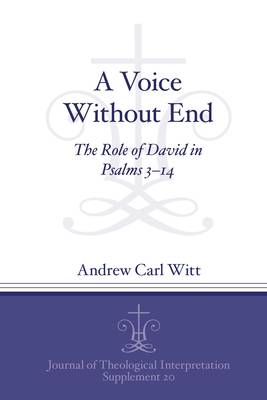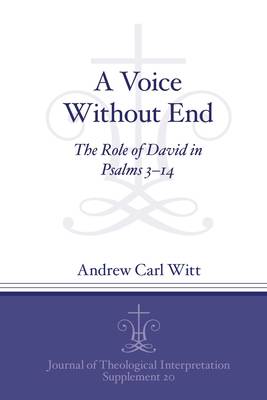
- Retrait gratuit dans votre magasin Club
- 7.000.000 titres dans notre catalogue
- Payer en toute sécurité
- Toujours un magasin près de chez vous
- Retrait gratuit dans votre magasin Club
- 7.000.0000 titres dans notre catalogue
- Payer en toute sécurité
- Toujours un magasin près de chez vous
Description
The past fifty years have seen a strong interest in the shape and the message of the book of Psalms. In A Voice Without End, Andrew C. Witt evaluates the significance of Psalms 3-14, and in particular, the presence and function of the figure of David.
Using representative interpreters and canonical and literary approaches, Witt uncovers how the book of Psalms develops its own speaking personae. He argues that the introduction to the book in Psalms 1-2 and the association with David in the superscriptions set up the figure of David as the principal voice within Psalms 3-14, constructing a Davidic persona who can speak as an ideal and representative figure, as well as a typological figure, in expectation of the establishment of a just kingdom in the context of the Davidic promises. In addition to its original analysis of Psalms 3-14, this study contributes to Psalms research by sharpening our understanding of the Davidic voice and by showing that key themes and motifs at the seams of the Psalter and in its thematic center are already active and engaged at the very beginning. Further, it helps to bridge premodern and modern psalm interpreters by demonstrating the ongoing value of premodern conceptual models for analyzing voices in the text.
Pathbreaking and eminently readable, this book changes both the way we read the Psalter and how we understand its relationship with David. It will appeal to biblical studies scholars and seminarians.
Spécifications
Parties prenantes
- Auteur(s) :
- Editeur:
Contenu
- Nombre de pages :
- 254
- Langue:
- Anglais
- Collection :
- Tome:
- n° 20
Caractéristiques
- EAN:
- 9781646021116
- Date de parution :
- 24-03-21
- Format:
- Livre broché
- Format numérique:
- Trade paperback (VS)
- Dimensions :
- 152 mm x 229 mm
- Poids :
- 381 g

Les avis
Nous publions uniquement les avis qui respectent les conditions requises. Consultez nos conditions pour les avis.






